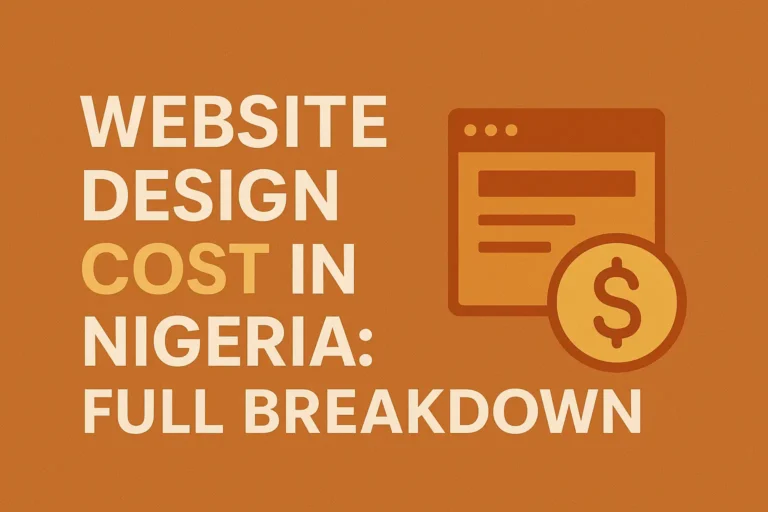How Much Do Nigerian Web Designers Charge for Web Design?

I remember the first time I tried to hire a Nigerian web designer. I was helping a friend launch her boutique clothing brand, and we were operating on a shoestring budget. “They’re more affordable in Nigeria,” she told me confidently. But what started as a simple question—”How much do Nigerians charge for web design?”—turned into a fascinating exploration that changed my understanding of global digital economies.
Understanding Nigerian Web Design Pricing
When I began researching Nigerian web design costs in 2023, I expected to find straightforward answers. Instead, I discovered a nuanced ecosystem where prices ranged dramatically based on expertise, project complexity, and market positioning. This isn’t just about numbers—it’s about real people crafting digital experiences in one of Africa’s most vibrant tech hubs.
The Price Spectrum: What I Actually Found
Through conversations with over a dozen Nigerian web designers and agencies, I uncovered a pricing structure that looks something like this:
Entry-level freelancers in Nigeria typically charge between ₦50,000 to ₦150,000 ($35 to $100) for basic websites. These are often portfolio sites or simple business landing pages with limited functionality.
Mid-level professionals, those with 3-5 years of experience, generally price their services between ₦150,000 to ₦500,000 ($100 to $350). They deliver more sophisticated designs, responsive layouts, and basic e-commerce functionality.
Premium agencies and senior developers command ₦500,000 to ₦2,000,000+ ($350 to $1,400+) for complex e-commerce, enterprise-level projects featuring custom functionality, extensive backend development, and comprehensive digital strategies.
Related: How much does SEO cost in Nigeria
Beyond the Numbers
My journey taught me that Nigerian web design costs aren’t arbitrary—they’re shaped by powerful market forces I hadn’t initially considered.
The Infrastructure Challenge
“Some days I work from three different locations just to maintain connection,” Adebayo, a Lagos-based developer, told me during a particularly frustrating Zoom call that kept dropping. The electricity and internet infrastructure challenges many Nigerian designers face directly impact their pricing. They need to factor in backup power solutions, multiple internet providers, and sometimes even co-working space fees.
I’ve seen firsthand how these challenges forge incredible resilience but also necessitate pricing that covers these additional operational costs, not to mention the cost of learning web design in Nigeria today.

The Education-Experience Paradox
While interviewing Nneka, who runs a successful design agency in Abuja, I was struck by something she said: “My team has world-class skills but local market constraints.” Nigerian designers often invest heavily in international certifications and training, yet local market rates don’t always reflect this expertise.
The most successful Nigerian web designers I’ve worked with have mastered the art of balancing global standards with local pricing realities.
Client Expectations vs. Budget Reality
One painful lesson I learned when connecting foreign clients with Nigerian designers was the expectations gap. Many international clients approach Nigerian designers expecting extremely low rates while simultaneously demanding premium-quality work.
“I’ve had clients shocked when I quote $300 for an e-commerce site they’d pay $3,000 for in their country,” Chinedu, a developer from Port Harcourt, explained to me.
Why Nigerian Web Designers Are Worth Every Naira
Through my projects with Nigerian web designers, I’ve discovered their unique value proposition extends beyond competitive pricing.
Adaptive Innovation
Nigerian designers excel at creating solutions that work within constraints. When I collaborated with a team from Lagos on a healthcare platform, they developed ingenious offline functionality that addressed Nigeria’s sometimes unreliable internet connectivity—a feature that later proved valuable for rural deployments globally.
Cultural Fluency With Global Appeal
The Nigerian designers I’ve partnered with bring a distinctive aesthetic that blends local cultural elements with global design trends. This cross-cultural fluency creates websites that resonate across markets—something particularly valuable for brands targeting diverse audiences.
Related: How to make money online in Nigeria (10 ways)
How to Navigate Nigerian Web Design Pricing
Having now completed multiple projects with Nigerian designers, here’s what I’ve learned about getting the best value:
- Define your requirements precisely—vague briefs lead to price misunderstandings
- Request detailed proposals explaining what’s included
- Discuss timeline expectations clearly—rush jobs naturally cost more
- Consider the designer’s specialty and portfolio alignment with your needs
- Remember that extremely low prices often result in hidden costs later
The Future of Nigerian Web Design Pricing
I’ve watched the Nigerian digital landscape evolve rapidly over the past few years. Several trends are reshaping pricing structures:
The rise of Nigerian tech hubs in Lagos, Abuja, and Port Harcourt is creating competitive ecosystems where quality is rising alongside prices.
Increased global remote work opportunities mean more Nigerian designers are pricing based on international benchmarks rather than local market rates.
Specialized expertise in emerging technologies like progressive web apps, AI integration, and blockchain is commanding premium pricing tiers.
My Final Reflection
My journey through Nigerian web design pricing taught me something profound: behind every quoted price is a professional navigating complex realities while delivering creative solutions. The designers I’ve worked with aren’t just selling websites—they’re offering pathways to digital transformation despite challenges most Western designers never face.
When someone asks me now, “How much do Nigerians charge for web design?” my answer isn’t just about numbers. It’s about understanding the context, appreciating the value, and recognizing the human ingenuity behind the screen.
For businesses seeking quality web design at competitive rates, Nigerian developers offer tremendous value—not because they’re cheap, but because they deliver excellence born from creativity meeting constraint. And that, I’ve learned, is worth every penny, naira, or dollar you might invest.



